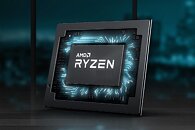Wednesday, December 16th 2020

Cezanne Stretches Its Legs: AMD Ryzen 7 5800H System Benchmarked
AMD's Zen 3 core has seen some major performance uplift, with the first products based on it being the 5000 series desktop processors codenamed "Vermeer". With the efficiency that this new core brings and IPC increase, it is only a matter of time before it scales down to mobile processors. Today, thanks to the findings of TUM APISAK, we get to see some performance results of AMD's upcoming Ryzen 7 5800H "Cezanne" processors. Benchmarked in the Geekbench 5 test suite, the CPU was spotted running at the base frequency of 3.20 GHz, and boost frequency of 4.44 GHz. This is only an engineering sample so the real product may have different clock speeds.
The CPU managed to score 1475 points in single-threaded results while having 7630 points in a multi-threaded scenario. If you wonder how does it fare to the last generation that it replaces, the Ryzen 7 4800H scored 1194 points for ST, and 7852 points for MT. That means that the new Ryzen 7 5800H CPU has a 23% performance boost for ST workloads, showing the Zen 3 capability. The MT score is not representative as we do not have the final product yet, so we have to wait and see how it performs when reviews arrive.
Source:
TUM_APISAK (Twitter)
The CPU managed to score 1475 points in single-threaded results while having 7630 points in a multi-threaded scenario. If you wonder how does it fare to the last generation that it replaces, the Ryzen 7 4800H scored 1194 points for ST, and 7852 points for MT. That means that the new Ryzen 7 5800H CPU has a 23% performance boost for ST workloads, showing the Zen 3 capability. The MT score is not representative as we do not have the final product yet, so we have to wait and see how it performs when reviews arrive.


39 Comments on Cezanne Stretches Its Legs: AMD Ryzen 7 5800H System Benchmarked
I'm looking forward to a new laptop build in 4-6 months after the recent Zen 3 desktop ugrade. ;)
WHY is Geekbench always the first benchmark that pops up for a new chip? I know it's supposed to be cross platform, but honestly, who cares that much about it? It's not the FIRST thing you want to know. I bet all of us here in this thread wants to compare it with older AMD and Intel CPU's, first and foremost.
For every IGP gaming laptop sold there are 20 discrete graphics gaming laptops or boring office laptops sold, meaning that the beefier IGP isn't cost effective.
It's not like TSMC can produce all the chips anyway, with Ryzen, Radeon, XBox and PS5, sold out everywhere. With a larger die, cost goes up, yield goes down, and less production capacity for every other product that's on the line. IGP gaming is not prioritised, obviously, since the market is so small and low budget compared to everything else.
Tiger Lake has the faster IGP, last time I checked.
Look at published sales volumes; People buy 15W parts. 25W at most. When I say "people" I mean like >95% of all laptops sold to all demographics in all regions, period.
Intel is still a huge chip maker and is able to produce in volume. TSMC can probably produce very large volumes, but for many customers...